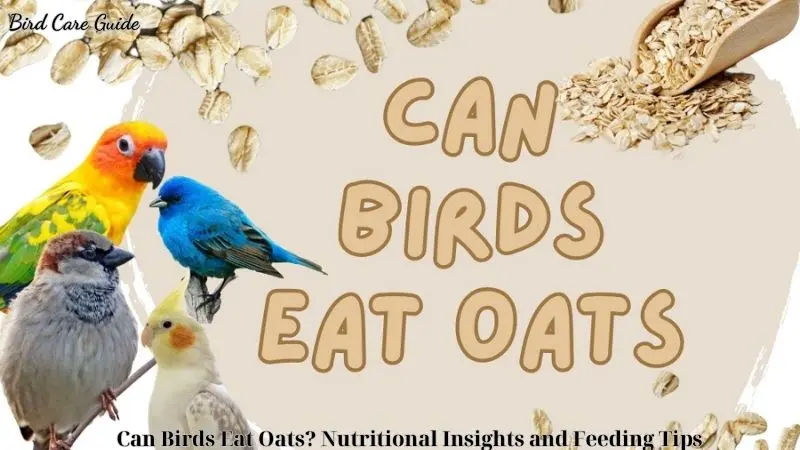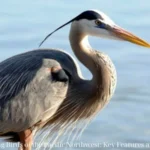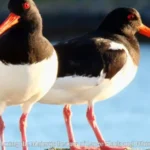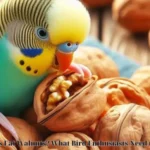Birdwatching is a delightful hobby that brings joy to many nature enthusiasts. Providing food for our feathered friends is an integral part of this hobby, as it not only attracts a variety of bird species but also supports their health and well-being. One question that often arises among bird lovers is, “Can birds eat oats?”.
In today’s article, “Bird Care Guide” will explore the nutritional value of oats, the potential benefits and risks of feeding oats to birds, and practical tips for incorporating oats into your diet.
Understanding Birds’ Dietary Needs
Birds have diverse dietary requirements that vary depending on their species. Generally, birds can be classified into several categories based on their primary food sources:
- Insectivores: Birds that primarily eat insects, such as warblers, swallows, and woodpeckers.
- Granivores: Birds that primarily consume seeds and grains, including finches, sparrows, and pigeons.
- Frugivores: Birds that mainly eat fruits, such as orioles and tanagers.
- Nectarivores: Birds that feed on nectar, like hummingbirds and sunbirds.
- Omnivores: Birds with a varied diet that includes insects, seeds, fruits, and other food sources, such as crows, jays, and many species of thrushes.
Understanding these dietary preferences is essential when considering whether to offer oats to birds.
The Nutritional Value of Oats
Composition of Oats
Oats (Avena sativa) are a type of cereal grain known for their nutritional benefits. They are composed of several essential nutrients, including:
- Carbohydrates: Oats are rich in complex carbohydrates, providing a steady energy source.
- Fiber: High in dietary fiber, especially beta-glucan, which is beneficial for digestion.
- Protein: A good source of plant-based protein, crucial for muscle development and repair.
- Fats: Contains healthy fats, though in relatively low amounts.
- Vitamins and Minerals: Includes vitamins B1 (thiamine), B5 (pantothenic acid), folate, and minerals like magnesium, iron, zinc, and manganese.
Benefits for Birds
Feeding oats to birds can offer several benefits:
- Energy Boost: The carbohydrates in oats provide birds with the energy they need for daily activities.
- Digestive Health: The fiber content aids in digestion and helps maintain a healthy gut.
- Muscle Development: Protein supports muscle growth and repair, essential for active birds.
- Overall Health: Vitamins and minerals contribute to various bodily functions, enhancing overall health and vitality.
Can Birds Eat Oats?
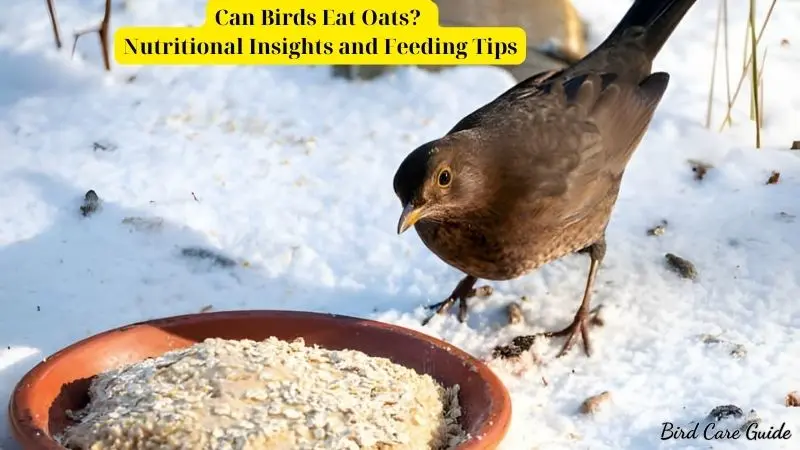
Can Birds Eat Oats? The short answer is yes, many birds can eat oats. Granivorous and omnivorous birds, in particular, are likely to enjoy oats as part of their diet. However, it is essential to offer oats in moderation and in a manner that is safe and appealing to birds.
Which birds eat oats?
Several common backyard bird species enjoy oats, including:
- Sparrows: These small birds are frequent visitors to feeders offering oats.
- Finches: Finches, including goldfinches and house finches, readily eat oats.
- Blackbirds: Species like red-winged blackbirds and grackles will consume oats.
- Doves: Mourning doves and other dove species can eat oats.
- Pigeons: Pigeons are known to eat a variety of grains, including oats.
Types of Oats Suitable for Birds
There are various types of oats available, and not all are equally suitable for birds. Here are the most common types and their suitability for bird feeding:
- Whole Oats: These are unprocessed oats that retain their outer husk. While they are nutritious, they can be tough for smaller birds to eat. Larger birds, such as pigeons and doves, may handle them better.
- Rolled Oats: Also known as old-fashioned oats, these are steamed and flattened whole oats. They are easier for birds to eat and can be offered as-is or slightly moistened.
- Steel-Cut Oats: These are whole oats that have been chopped into pieces. They are more digestible than whole oats but still require soaking or cooking to soften them for birds.
- Quick Oats: These are pre-cooked and rolled thinner than regular rolled oats, making them easier for birds to eat. They can be offered dry or moistened.
- Instant Oats: These are highly processed oats that often contain added sugars and flavors. It is best to avoid feeding instant oats to birds due to the potential presence of harmful additives.
How to Incorporate Oats into Your Bird’s Diet
Introducing oats into your bird’s diet requires careful consideration to ensure they are well-received and beneficial.
Serving Raw Oats
Raw oats can be offered to birds, but they should be soaked beforehand to make them easier to digest. Soaking raw oats in water for a few hours or overnight softens them and reduces the levels of phytic acid. This method is simple and preserves the nutritional integrity of the oats.
Cooking Oats
Cooking oats is another way to prepare them for birds. Cooked oats are easier to digest and more palatable for some birds. Ensure the oats are cooled before serving, and avoid adding any seasonings, sugars, or additives. Cooked oats can be mixed with other bird-safe foods to create a nutritious and balanced meal.
Mixing with Other Foods
Oats can be mixed with other bird-friendly foods to create a varied and appealing diet. Consider combining oats with fresh fruits, vegetables, seeds, and nuts. This not only enhances the nutritional value but also keeps the bird’s diet interesting and prevents monotony.
Using Oats in Homemade Bird Treats
Homemade bird treats can be a fun and nutritious way to incorporate oats into your bird’s diet. Combine oats with ingredients like peanut butter, honey, and dried fruits to create healthy and delicious treats. Ensure all ingredients used are safe for birds and free from harmful additives.
Feeding Tips and Precautions
When feeding oats to birds, it is essential to follow certain tips and precautions to ensure their safety and health.
Introduce Gradually
When introducing oats to your bird’s diet, do so gradually. Start with small amounts and observe how your bird responds. Gradual introduction helps prevent digestive upset and allows you to monitor your bird’s acceptance of the new food.
Monitor for Allergies
Although rare, some birds may have allergies or sensitivities to oats. Watch for signs of adverse reactions, such as changes in behavior, digestive issues, or skin problems. If any negative symptoms occur, discontinue feeding oats and consult a veterinarian.
Maintain a Balanced Diet
Oats should be part of a balanced diet that includes a variety of foods. Birds require a range of nutrients to thrive, so ensure they have access to fresh fruits, vegetables, seeds, and proteins in addition to oats. A diverse diet supports overall health and prevents nutritional deficiencies.
Avoid Flavored or Sweetened Oats
Flavored or sweetened oats, often marketed for human consumption, can contain additives that are harmful to birds. Always choose plain oats without any added sugars, flavors, or preservatives. These additives can negatively impact a bird’s health and should be avoided.
Conclusion
Incorporating oats into a bird’s diet can offer numerous nutritional benefits, from aiding digestion to providing sustained energy. Understanding the types of oats suitable for birds and the proper preparation methods ensures that your feathered friends can enjoy this nutritious food safely. By following the feeding tips and precautions outlined in this article, you can confidently add oats to your bird’s diet, contributing to their overall health and well-being.

